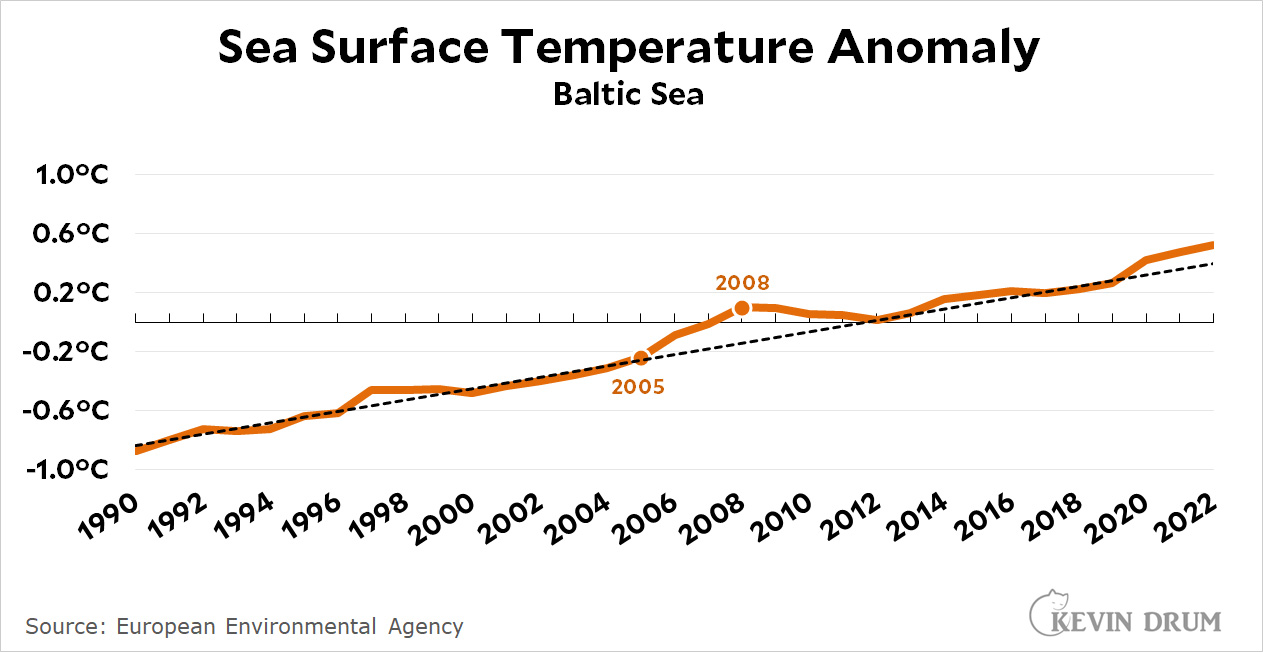Yesterday I wrote about new regulations limiting sulphur content in the bunker fuel used by oceangoing vessels. I concluded that the effect on climate change of these limits was minuscule, but today Alex Tabarrok links to an article in Science that suggests the effect might have been more substantial.
But there are reasons for skepticism. On average, solar radiation amounts to about 1000 watts per square meter. According to a study quoted in the article, this compares to an increase of 0.1 w/m² due to the sulphur limits. That's not a lot.
The 1991 Pinatubo volcano, for example, reduced solar radiation by about 4 w/m², which led to a global temperature drop of 0.5°C. This suggests that a change of 0.1 w/m² would produce a global increase of about 0.012°C, a very small amount.¹
But what about the North Atlantic specifically, where ship traffic is heavy? The study estimates that the effect on solar radiation is about ten times stronger, which might lead to a sea temperature increase of 0.12°C—though this is probably an upper limit thanks to the inertia of ocean temps. This compares to a recorded increase of 0.91°C so far this year. In other words, the sulphur limits are responsible for at most one-eighth of the total warming.
There are other reasons for skepticism. Certain regions of the world are designated as special Emission Control Areas. Sulphur content in these areas was limited to 1.5% in 2005. One such area is the Baltic Sea, but nothing happened there when the new limits took effect:
 We're currently seeing a big sea temperature rise in the North Atlantic three years after new sulphur limits took effect, but if you take a look at 2008, which is three years after the ECA limits took effect, sea temperatures start to drop in the Baltic Sea. And in the 17 years since the limits started, Baltic temps have just followed their previous trendline.
We're currently seeing a big sea temperature rise in the North Atlantic three years after new sulphur limits took effect, but if you take a look at 2008, which is three years after the ECA limits took effect, sea temperatures start to drop in the Baltic Sea. And in the 17 years since the limits started, Baltic temps have just followed their previous trendline.
Put all this together and there's still little reason to think that the sulphur limits have had much effect on either global warming in general or on North Atlantic sea temperatures specifically. Without all the other factors in play,² it's unlikely we'd even notice anything different.
¹Yes, I'm assuming a linear response. I think that's safe at low levels.
²The eruption last year of an undersea volcano near Tonga; a strong El Niño this year; and an unusual lack of Saharan dust over the ocean.

Mt. Pinatubo injected material up into the stratosphere, so had a much large effect on shading the earth than SO2 released near the surface--not to mention all the other issues the latter causes.
see also: https://en.wikipedia.org/wiki/1991_eruption_of_Mount_Pinatubo
Bingo. AFAIK, injection of sulfur into the atmosphere needs to be into the stratosphere before it has any global effect. There was a lot of discussion about this a few years back on Real Climate.
I looked at the headline and went "Pphphpht". The official spelling is "sulfur", even in Commonwealth countries, though "sulphur" is still common.
While we're at it, the abbreviation for watt is W, not w.
Another factor is the fact that the sulphur from ships is released on the ground whereas the idea for climate engineering is to release it high up in the atmosphere, above the level of rain clouds.
Rain will wash out the sulphur from ground sources like ships and put it into the ocean (to prevent this is presumably the rationale for the limits in the first place) where it won't influence the climate.
At any rate we should not try to achieve one environmental goal by sacrificing another. Sulphur is a serious problem (from coal and oil burning), the acidity associated with it is far stronger than the one from CO2.
I believe it is missing one important point in the analysis. Basically, it can have an significant *short* time effect and no *long* time effect. So it can be responsbile for a higher Summer heatwave.
All the info I got in this topic is from "under a white sky" by Elizabeth Kolbert. But basically, the point of emitting sulphur to cool down the atmosphere is that it works, until the particles fall back down to Earth, then it doesn't work. So if you emit some sulphur, it does cool it down some, but does little in the long run because you have to pump more and more. Of course, the amount was not increasing to keep up with cooling demand, so the trend line was for increasing. But it does have a short term effect.
In the book, Kolbert points out the fact that you could send rockets with that sulphur and cool down the earth. But that would only give us a sense of: oh yeah, we've done it, and keep pumping out more CO2 which would build up under that sulphur shield, which would fall down (with whatever consequence for living organisms on Earth who will then breath or be coated with it) and now you have an atmosphere that is even more primed to heat up the Earth because of the CO2 emitted in the mean time.
So... You're saying that three years later we are seeing the start of a short term effect?